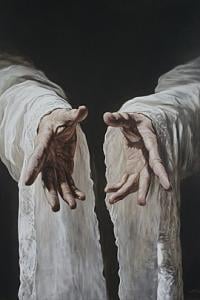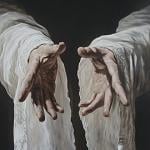
This article begins a brief series on miracles. I realize that just the title will raise questions, and some readers will wonder, then what are all of those events that the Gospels describe. I will deal with that question in an article to come. Today, give me the space to explain today’s title.
The focus of this reflection will be John’s Gospel, chapter one, verses one through five:
1 In the beginning was the Word, and the Word was with God, and the Word was God. 2 He was in the beginning with God. 3 All things came into being through him, and without him not one thing came into being. What has come into being 4 in him was life, and the life was the light of all people. 5 The light shines in the darkness, and the darkness did not overcome it. (NRSV)
+++
Steve was one of my closest friends during the days that I lived and studied in England. His family was from Chicago. He did a Masters of Divinity in the area, and, while – at Oxford – I was working on a degree in New Testament studies, he was pursuing a degree in the philosophy of religion.
Despite the differences in our work, we spent hours reading one another’s work and offering one another constructive criticism. We also bonded over our love of dark, strong coffee – lots of dark, strong coffee.
Steve moved back to the United States and ended up in Seattle, Washington. There he discovered that he didn’t like teaching as much as he thought he might and went into business. But we stayed in touch and talked from time to time.
Years passed and while we were both in our fifties, Steve called to let me know that he had pancreatic cancer. I made arrangements to fly to Seattle and I spent several days with Steve and his wife. By the time we got together, the cancer had spread to his liver and most of his days were difficult. But we did manage one day at Starbucks. We continued to talk by phone but it was the one and only visit we had time to arrange.
In thinking back over our conversations, I was struck by the all but schizophrenic path that Steve was forced to walk in those final months of his illness. He was a person of great faith but he was also the product of the American and British academic worlds, which then – at any rate – prized analytical thought more than anything else. He brought both sides of his life to bear on his illness but they occupied two completely different spheres of his life.
On the analytical side, he studied and mastered every detail of his cancer and its treatment. He may not have known much about the granular details associated with pancreatic cancer, but he probably knew as much as his doctor’s did about the specifics of his own case. And he used that knowledge to advocate for himself – exploring every possible treatment available, including some experimental and very painful regimens. To the very end he fought his illness with everything that science made available.
At the same time, he never abandoned his faith. He leaned on the the prayers of his wife, his church, and his friends. And – as if the medical treatments didn’t matter at all – he often reflected on the importance of God intervening on his behalf.
I don’t think Steve is unique in the way that he responded. In fact, in a world where – at the extremes – people either reject the power of medicine or despise the power of prayer, the vast majority of Christians are forced to live their lives out between these two views of life. And most people are never offered anything approaching a wholistic view of issues that swirl around miracles, science, and the frail character of our existence.
Now, on the face of it, that tension may seem like a very heady, theoretical problem. But consider this: When we face a crisis, illness, or death, we are plunged into a place where we begin looking for solutions and, if that challenge is not resolved – or can’t be resolved quickly – then we are forced to lurch between two very different ways of thinking about our lives: one that is thoroughly materialistic and one that is seemingly divorced from material concerns and looks for the miraculous as the sole evidence of God’s presence.
That is not just an academic problem. It is a painful, lonely place. And that kind of schizophrenia (as I am choosing to describe it) leaves us in a painful and confused state in life’s most difficult moments where we often find ourselves thinking, have I prayed enough? Am I as faithful as I should be? And – is God even there? That is not where Christians should be forced to live.
In the next four weeks I hope to help you think about those issues and others. But today I would like to talk about the way in which we understand God’s presence in our world, the way in which we define miracles, and I want to suggest to you this morning that much of what we think about both of those topics is not at all biblical, let alone helpful.
I began with the first verse of John’s Gospel for that reason. Like all three of the other gospels, John inevitably talks about what we often describe as the miracles of Jesus. And, in fact, after he sets the stage in chapter one for the ministry and teaching of Jesus, he turns immediately in chapter two to what is described by commentators as the miracle at the wedding in Cana, where Jesus changes water into wine.
But the first thing to note is that everything John has to say about the ministry of Jesus is grounded in the conviction he offers at the beginning of his Gospel which – by the way – was also part of an ancient creed:
“In the beginning was the Word, and the Word was with God, and the Word was God. He was in the beginning with God. All things came into being through him, and without him not one thing came into being.
In these opening words John makes clear what we might only surmise from the other Gospels. Jesus is the “Word”, the “Logos”, the mind of God. He isn’t made God or declared by God to be the Son. He isn’t the latest version of God. He – no less than the other members of the Trinity — is present at the very beginning of creation and his presence makes creation possible and sustains it.
As such, creation expresses the mind of God. The material world participates in the beauty of God. And it continues to depend upon God. As Eastern Orthodox Christians observe, God continues to breathe life into creation, without which it would cease to exist. At the same time, John makes it clear that God is not in creation, nor is creation a part of God, but transcends it.
How does this change the way in which we live our lives? It requires that we reject two popular ways of navigating life. One is the materialist view: The belief that the world, our bodies, and the universe are simply overlapping machines with their rules of operation. They are, in fact, God’s work. And the healing properties of our bodies, the drugs that we develop, and the medical procedures that sustain us are of a piece with the creative genius of God.
It also means that Christians reject the notion that creation deserves our worship or that it contains healing properties of its own. The solution to the arid materialism of our day is not the deification of our bodies or of nature.
To put it positively, it means we should also see the benefits of medication, the efforts of physicians, the insights of medical science and the healing properties of our bodies as part and parcel of God’s gracious provision for us.
John also make it clear, however, that we need to rethink the way in which we define miracles. Indeed – to put it pointedly – we need to grapple with the fact that miracles – as we popularly understand them – are not biblical. Next week we will come back to the fact that the Bible doesn’t even use the word, “miracle,” – in Hebrew or in Greek. But for now, it is enough to note that John’s Gospel sabotages the popular meaning of miracles.
You see, when most of us use the word, “miracle”, what our cultural and intellectual heritage has taught us to think of is “an interference with nature by supernatural power” (C.S. Lewis, Miracles) But, if we take our direction from John’s Gospel, rather than centuries of intervening philosophical assumptions, it is clear that there can be no such thing as “interference with nature”, if God is both nature’s author and nature’s on-going inspiration.
Instead, whatever events we might describe as miraculous are simply a product of God’s providential care and sustaining love. And God is just as intimately present in the rising and setting of the sun, in the smile of a baby, or in the air that we breathe. Everything that happens in life, then, whether we consider it “normal” or “exceptional” is the outworking of God’s grace.
This means, too, that as Christians, we should also free ourselves of some other very unbiblical ideas:
- The reality and presence of God is not confined to miraculous. The last thing we need is a “God of the gaps” who shows up now and then to intervene in our lives.
- The measure of our faith is not the number of miracles that we can say we have witnessed.
- Struggle, illness, and even death are not evidence of a lack of faith. (I trust you have all noticed we are mortal.)
Our lives are given to us by God and God has entered into our world in the life, death and resurrection of his Son. But the way out is the way through, hand in hand with him.
He bore his cross and he calls us to bear ours, and any understanding of the Gospel that suggests that the path he offers us is a way out – miraculous delivery, after miraculous delivery – a life without a cross – is a distortion of that message. Whatever the course of our lives, may we live in complete availability to God and gratitude for his grace in all its forms.
It is that kind of peace, the sense of embrace that I wish my friend, Steve, had been able to enjoy. Perhaps he did, despite the struggle. But I hope that for you, it may not be as great.
Gracious God, you have called us to be your disciples, and just as you carried your cross, you have called us to carry ours. You have also reminded us that we are called to reclaim the world that you have made. We confess that all too often, we look for deliverance from that calling. We forget that you are present to us whatever our life circumstances, and we treat you as a stranger, remote and unavailable unless you perform a miracle. Give us the strength and courage that arises from the knowledge that you are the source of all that is, the redeeming light of the world, and our ever-present Lord.
Amen.











